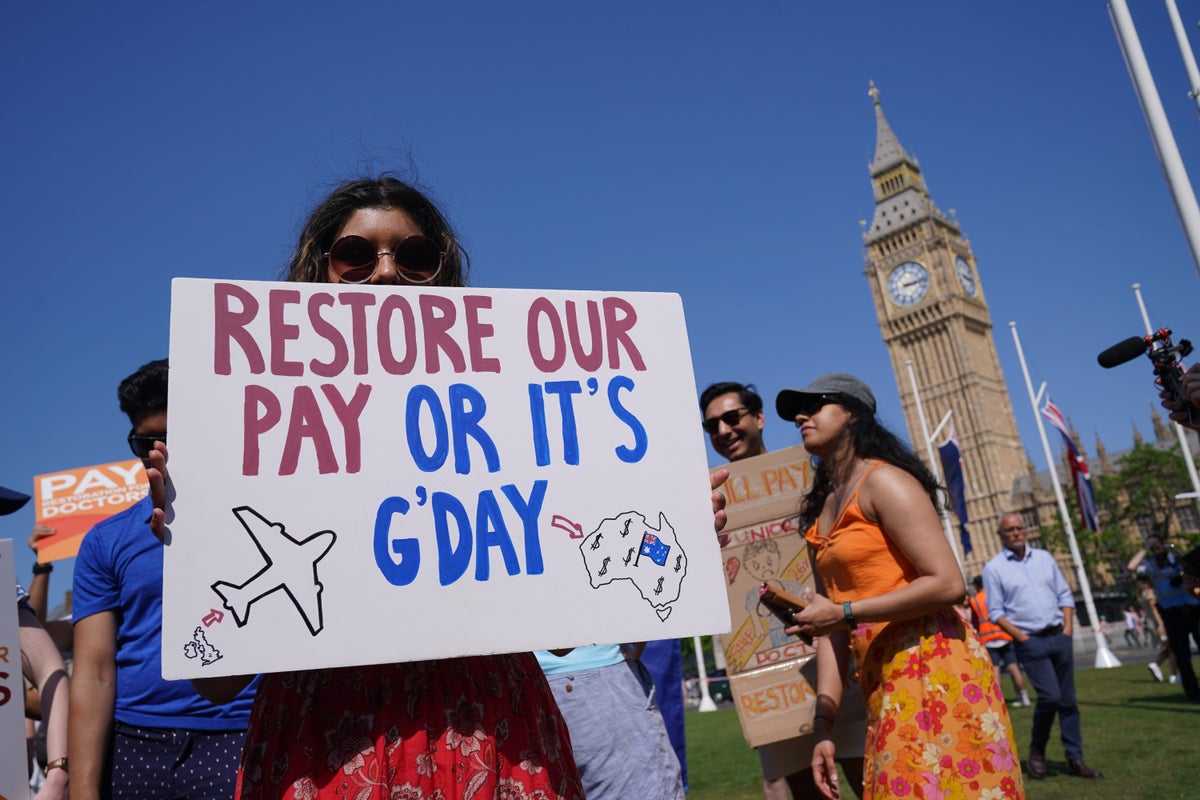
Teachers are poised to end months of strikes after Rishi Sunak announced pay rises of up to 7 per cent for millions of public sector workers – but doctors show no sign of calling off their action.
Teachers have been offered a 6.5 per cent rise and junior doctors 6 per cent, plus an additional £1,250.
But the British Medical Association (BMA) said the below-inflation offer was “exactly why so many doctors (feel) they have no option but to take industrial action”.
As the longest walkout in NHS history got underway, the prime minister told all unions his offer was final and implored doctors to “do the right thing and know when to say yes”.
Downing Street said it would not borrow more money or increase taxes to fund the more than £2bn needed this year to fund the pay rises.
Mr Sunak said more than £1bn would be found by “significantly” raising fees for migrants’ visa applications and access to the NHS.
But roughly the same amount will be found through “reprioritisation” – raising the prospect of cuts. However, it is understood this will be cross-government, removing pressure on individual departments, like education, to find the money for pay rises for teachers.
For her part, education secretary Gillian Keegan promised there would be no cuts to frontline education services.
Ben Zaranko, senior research economist at the Institute for Fiscal Studies, warned that wage increases would eventually require cuts to public budgets; that prompted the BMA to accuse the government of making “ordinary people sicker and poorer”.
Unite union general secretary Sharon Graham said the pay offer would place staff under new pressure and predicted: “I think we’ll be seeing a new wave of industrial action.”
Speaking at a press conference, Mr Sunak said he would accept the recommendations of all the government’s independent pay review bodies; other rises include 7 per cent for police and prison officers, 6 per cent for dentists and NHS consultants, and 5 per cent for members of the armed forces.
He admitted that his announcement would “cost all of you as taxpayers more than we had budgeted for”.
He added: “That’s why the decision has been difficult, and why it has taken time to decide the right course of action. I can confirm today that we are accepting the headline recommendations of the pay review bodies in full, but we will not fund them by borrowing more or increasing your taxes.”
Ministers are struggling to fight persistent high inflation at the same time as bringing to an end to industrial action by groups including doctors.
But BMA chair of council Professor Phil Banfield said the government “missed a huge opportunity to put a credible proposal on the table to end strikes”.
He said consultants “remain willing to talk” but the offer means “they are likely to continue to take industrial action”.
Treasury minister John Glen told the Commons the pay award for teachers “will be fully funded”. As part of reprioritising budgets, the Ministry of Defence will recruit fewer civil servants.
But unions said the decision to fund some of the rises by drawing on departmental budgets was the wrong approach.
Mike Clancy, general secretary of civil service union Prospect, said: “For a prime minister and chancellor who came into office promising economic stability, the chaotic handling of this process will inspire little confidence in workers worried about their futures during the worst cost-of-living crisis in a generation.
“The fact that they are taking a knife to public services to pay for these pay rises signals that they have learned nothing from the austerity years.”
Experts warned the education and health budgets could still face cuts worth billions of pounds, even with frontline services protected.
Mr Zaranko said: “At this point, we can’t say with any certainty where the funding for higher pay rises will come from, although Rishi Sunak has made clear that it will not come from increased borrowing or higher taxes. In the short-term, some could come from under-spends in other parts of the budget, but that’s not a permanent solution.”
He said extra revenue through higher charges for visa applications and for non-British nationals using the NHS would be “unlikely to cover all of the additional cost”. Without rises in borrowing or tax the move will “eventually require either a smaller public sector workforce, or cuts to some other aspect of public service budgets”.
Praxis, which supports migrants and refugees, said that raising “already eye-wateringly high” visa fees risks seeing people fall “deeper into poverty and insecurity”. Josephine Whitaker-Yilmaz, policy and public affairs manager, said migrants in the UK pay some of the highest costs in Europe.
Mr Sunak has promised to halve inflation – to 5 per cent – this year. But the CPI inflation is running at 8.7 per cent, amid fears pay increases are fuelling a wage-price spiral. Official figures released just hours before the announcement also showed the UK economy contracted in May. Ministers hope the decision not to borrow to fund the pay rises will minimise the impact of the decision on inflation.







